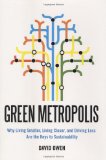Green Metropolis
Author David Owen, makes a strong argument, and one that flies in the face of many activities and technologies that are traditionally labeled as ‘green’ in Green Metropolis: Why Living Smaller, Living Closer, and Driving Less Are the Keys to Sustainability. Instead he argues that truly living green is living dense. In his own words his argument is that “living closer to one’s daily destinations, Manhattan-style, reduces vehicle miles traveled, makes transit and walking feasible as forms of transportation, increases the efficiency of energy production and consumption, limits the need to build superfluous infrastructure, and cuts the demand for such environmentally doomed extravagances as riding lawnmowers and household irrigation systems.”
Taking the debate further he challenges the conventional view of environmentalism, taking on the ideas that includes the protection and creation of large green spaces, local food production, and high-tech solutions such as solar panels and wind turbines arguing that “in terms of sustainability, dense cities have far more to teach us than solar-powered mountainside cabins or quaint old New England towns.” He takes it a step further arguing that large urban parks essentially sprawl out cities, and “inhibit many of the activities they are intended to encourage.”
While challenging the more traditional views of environmentalism, and taking on the U.S. energy he makes a compelling argument that the truest form of green living is the result of density.






















While there are many good reasons for living in the relatively compact, relatively dense city, the “peak oil/finite supply” reason is indeed the flimsiest. There is no evidence that the USA, or the World for that matter, has reached its oil-producing maximum or that Petroleum resources are precisely known and are declining.
Museum bookshelves are lined with “peak oil” studies from as far back as 1885. They are comical to read since they completely miss the concept of technology-growth. Looking at the hydro-carbon whole (liquid petroleum, methane, etc), we now know there are hundreds of years of usage available conveniently to the USA. One only has to look at the natural gas price to see how it collapses with the arrival of new supplies, e.g. shale gas.
Of the the 16 largest oil companies in the World (measured by reserves), only Exxon-Mobil (#16) is share-holder owned. The rest are State-owned. State-owned enterprises are notoriously dumb and inefficient. They have difficulty maintaining their existing infrastructure, much less finding new supplies..
Again, there are many wonderful reasons for city living, but “peak oil” theories shouldn’t be any of them.
Stephen, you’ve attacked an argument that isn’t in the review, then you fail to provide your own facts, relying on anecdote and nonsense.
Anyway, the review was not talking about global supplies, but domestic supplies. Look up how much energy the US imports and compare to the 70’s, we don’t even product half the oil we consume. This is especially true when we’re basically sending supertankers full of money back to people that don’t especially like us or respect our way of life.
Peak-oil aside, you’re right, there are many wonderful reasons for city living.